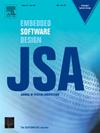The rCOS framework for multi-dimensional separation of concerns in model-driven engineering
IF 3.7
2区 计算机科学
Q1 COMPUTER SCIENCE, HARDWARE & ARCHITECTURE
引用次数: 0
Abstract
The software industry increasingly turns to Model-Driven Engineering (MDE) to mitigate complexity by automating model creation and transformation. Many organisations are pursuing Integrated Development Platforms (IDPs) to enhance automation in their software development processes within MDE. However, the adoption of MDE and engagement with IDPs remain limited due to concerns over their efficacy. We address these challenges in this review paper by introducing a framework for the formal refinement of component and object systems (rCOS). It provides: (1) a formal theory that consists of a modelling language (named OPL) with a calculus of refinement for object-oriented models and component models; (2) a suite of analysis and design techniques that facilitate abstractions and decompositions, leading to a multidimensional separation of concerns; and (3) an IDP (named rCOS Modeller) that supports modelling, design and verification from requirements elicitation through to coding. By advocating for an rCOS-enabled multidimensional approach to separating concerns, this paper offers a comprehensive solution to the challenges facing MDE and IDPs, paving the way for their successful implementation in practice. By delineating the emerging challenges and prospects associated with integrating formal methods for modelling and designing human-cyber–physical systems (HCPS), we show the potential of extending rCOS for MDE in HCPS.
模型驱动工程中多维关注点分离的 rCOS 框架
软件行业越来越多地采用模型驱动工程(MDE),通过自动创建和转换模型来降低复杂性。许多组织都在采用集成开发平台(IDP)来提高 MDE 中软件开发流程的自动化程度。然而,由于人们对集成开发平台的功效存在疑虑,因此 MDE 的采用率和参与度仍然有限。在这篇综述论文中,我们通过引入组件和对象系统(rCOS)的正式完善框架来应对这些挑战。该框架提供了:(1) 一种由建模语言(名为 OPL)和面向对象模型和组件模型的精炼微积分组成的形式理论;(2) 一套便于抽象和分解的分析和设计技术,从而实现多维度的关注点分离;(3) 一种 IDP(名为 rCOS Modeller),支持从需求激发到编码的建模、设计和验证。通过倡导采用 rCOS 支持的多维方法来分离关注点,本文为 MDE 和 IDP 所面临的挑战提供了全面的解决方案,为它们在实践中的成功实施铺平了道路。通过描述与集成形式化方法来建模和设计人-网络-物理系统(HCPS)相关的新出现的挑战和前景,我们展示了在 HCPS 中扩展 rCOS 进行 MDE 的潜力。
本文章由计算机程序翻译,如有差异,请以英文原文为准。
求助全文
约1分钟内获得全文
求助全文
来源期刊

Journal of Systems Architecture
工程技术-计算机:硬件
CiteScore
8.70
自引率
15.60%
发文量
226
审稿时长
46 days
期刊介绍:
The Journal of Systems Architecture: Embedded Software Design (JSA) is a journal covering all design and architectural aspects related to embedded systems and software. It ranges from the microarchitecture level via the system software level up to the application-specific architecture level. Aspects such as real-time systems, operating systems, FPGA programming, programming languages, communications (limited to analysis and the software stack), mobile systems, parallel and distributed architectures as well as additional subjects in the computer and system architecture area will fall within the scope of this journal. Technology will not be a main focus, but its use and relevance to particular designs will be. Case studies are welcome but must contribute more than just a design for a particular piece of software.
Design automation of such systems including methodologies, techniques and tools for their design as well as novel designs of software components fall within the scope of this journal. Novel applications that use embedded systems are also central in this journal. While hardware is not a part of this journal hardware/software co-design methods that consider interplay between software and hardware components with and emphasis on software are also relevant here.
 求助内容:
求助内容: 应助结果提醒方式:
应助结果提醒方式:


